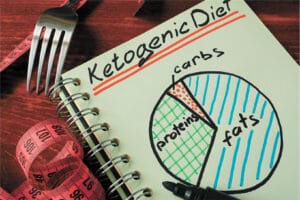We briefly explore the pros and cons to this very popular diet as well as what we recommend here at Cederquist Medical.
By Cederquist Medical Wellness Center


You can probably name at least one person in your social circle who has tried the “keto” diet. In this article, we’ll explore what it is, review some pros and cons, and summarize what we here at Cederquist Medical Wellness Center recommend.
What is it?
The “keto” diet, A.K.A “ketogenic” diet is a way of eating that incorporates high amounts of fat, moderate protein, and very low amounts of carbohydrates. It was first designed in the 1920s as a way to help treat and manage epilepsy, but in the last 15 years has gained massive popularity with the weight-loss crowd[1]. The purpose of the ketogenic diet is to mimic our bodies’ response to fasting by significantly reducing the amount of carbohydrates available and increasing the amount of dietary fat. This fat will then be converted into something called ketone bodies, which will be the main source of fuel – this is known as “being in ketosis”. Our body will use these ketone bodies as its primary source of energy, thus creating a convenient system of inputs and outputs – the input being fat for energy and the output being weight loss.
The Benefits of the Ketogenic Diet
– Can lead to weight loss. The ketogenic allows you to consume foods that are high in fat. These foods take longer to break down, increase satiety, and therefore help you stay full longer. It is important to focus on the quality of the fats you eat, however, as not all fats are created equal.
– Can help to reduce blood sugar and insulin levels. While this may be true, if you take medication for blood sugar and diabetes it’s important to talk to your doctor before making changes to your carbohydrate intake as your dosage of medications may need adjustment to prevent hypoglycemia.
– Can help to decrease triglyceride levels. High triglycerides are directly linked to an increased intake in simple carbohydrates, alcohol or sugary beverages. When we remove these food items from our diet, our triglyceride levels can drastically decrease.
– More effective in certain populations. As mentioned previously, the ketogenic diet was first developed for the treatment of epilepsy and continues to show promising results[2]. It has also been shown to be helpful for those with Type 2 Diabetes, morbid obesity and some research even shows it being helpful for Alzheimer’s Disease. However, it is not for everyone and it’s important to consult your doctor or a health care professional who understands your biology and metabolism.
The Cons of the Ketogenic Diet
– Unsustainable. Due to the fact that the keto diet is very restrictive, some people find it hard to stick to and maintain longer term.
– Risk of calorie and nutrient deficiencies. Because of the restrictions on the amount of fresh fruits, whole grains, legumes, and many vegetables, people on the keto diet miss out on many important vitamins and minerals. The high-fat nature of the keto diet can leave people feeling very full on small portions, risking calorie depletion and unintentional weight loss.
– Introduction of unhealthy fats. To meet fat content needs, people often resort to ingesting processed, high-calorie foods containing lots of sodium as well as saturated and trans fats.
– Constipation. People on the keto diet frequently do not get enough fiber which can lead to constipation.
– Bad Breath. Elevated ketone levels within the body is also known to cause bad breath.
Final Thoughts
Because of the restrictions a keto diet imposes as well as the potential risks, we at Cederquist Medical Wellness Center do not generally recommend keto diets to our patients. Each of us is different genetically and metabolically, so we take a scientific approach by analyzing each patient’s medical history, blood chemistry, metabolism, activity level, age, and how they feel. This information allows us to customize a plan that will work best for each individual. We find that most people lose a proper amount of weight through a balance of fat, protein, and carbohydrates and are more apt to keep it off long-term.
Here are a few general tips that may help you in your wellness journey as you decide what’s best for you:
– Avoid saturated fats, trans fats, and processed foods. Choose healthy fats such as olive oil, nuts, seeds, salmon, avocado, etc.
– Make sure to include quality, lean proteins such as chicken breast, turkey and white fish. The quality of what you eat matters!
– Adjust your carbohydrate intake to a level that’s right for you and your metabolism. This depends on your metabolism and how active you are.
If you’d like us to help you design your own personal diet plan, call us. Appointments are available.
Cederquist Medical Wellness Center
Call Today
239-593-0663
1575 Pine Ridge Rd.
Suite 19, Naples, FL 34109
[1] Whelness, James (2008). “History of the Ketogenic Diet”. Epilepsia vol. 49,8. Retrieved from: https://pubmed.ncbi.
nlm.nih.gov/19049574/
[2] Miera, Isabella, et.al. (2019). “Ketogenic Diet and Epilepsy: What We Know So Far” Frontiers in neuroscience vol. 13,5. Retrieved from: https://www.ncbi.nlm.nih.gov/
pmc/articles/PMC6361831/
 Southwest Florida's Health and Wellness Magazine Health and Wellness Articles
Southwest Florida's Health and Wellness Magazine Health and Wellness Articles

